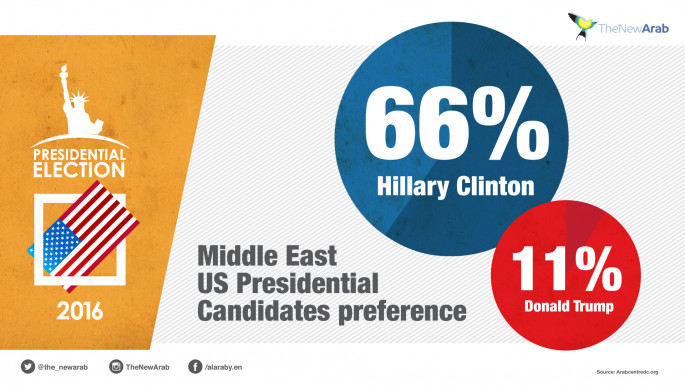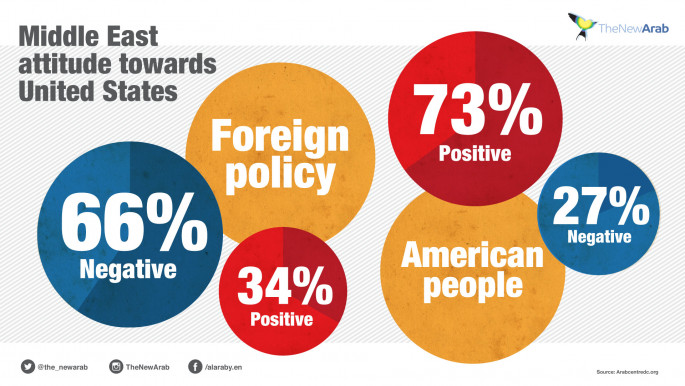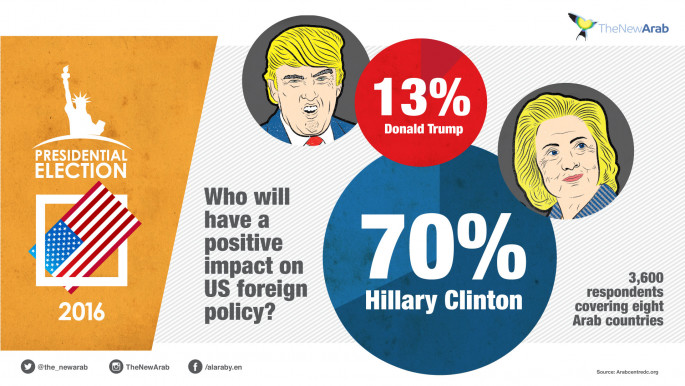If they could, most Arabs would vote for Hillary
While a majority of respondents held positive attitudes towards the American people in general, they expressed profound distrust of US foreign policy, especially in their region.
The poll, held by the Arab Center Washington DC (ACW) in cooperation with the Doha-based Arab Center for Research and Policy Studies (ACRPS), surveyed a randomly selected sample of 3,600 respondents covering Algeria, Egypt, Iraq, Kuwait, Morocco, the Palestinian Territories (the West Bank and the Gaza Strip), Saudi Arabia, Tunisia and Jordan.
There were 400 respondents from each country polled between October 21 and 31 by telephone.
On perhaps the most pressing question occupying the globe this week, namely the outcome of the US presidential race, the poll found that 56 percent of Arabs held generally positive views of Hillary Clinton.
 |
The most positive attitudes came from Tunisia, while the most negative views of Clinton were found to be held by Palestinians.
Meanwhile, sixty percent of Arabs surveyed saw Donald Trump in a negative light: Kuwaitis expressed the most negative views and Iraqis held the most positive views of Donald Trump.
Overall, the poll found that two-thirds of the Arab public prefer Clinton to become the next US president. Only eleven percent prefer Trump.
When asked about their general views of the United States, almost half of the Arab public expressed positive views.
However, consistent with similar public opinion polls, there is a strong Arab distrust in US foreign policy. The survey shows that anti-American sentiment in the Arab world targets US foreign policies in the region, and not the US as a country or its population.
 |
Regarding attitudes toward the American people, Kuwaitis and Jordanians hold the most positive views.
When asked about whether they believe the US presidential election will impact US foreign policy, roughly a third of Arabs said they did not expect the election to change global US policy, including in the Arab world.
Yet in comparing Hillary Clinton and Donald Trump, seventy percent of Arabs believe that Clinton will have the most positive impact on US foreign policy globally, while just thirteen percent believe Trump will have a more positive impact.
 |
But up to 34 percent of Palestinians said neither Trump nor Hilary would have a positive impact on US policy towards their country.
Interestingly, nearly twenty percent of Iraqi respondents expressed the most faith in Donald Trump, believing a Trump presidency would have a positive impact on US policy towards Iraq.
When asked about their opinion regarding the entities most influential in forming US foreign policy, Arab respondents rated the US Congress as the most influential, followed by the US president, and the pro-Israel lobby in third place.
Read the full results of the poll here.
![US elections [Getty] US elections [Getty]](/sites/default/files/styles/image_345x195/public/media/images/12109D90-9C3E-4097-BD7E-46FF49AF3935.jpg?h=d1cb525d&itok=eXM-M4DL)




 Follow the Middle East's top stories in English at The New Arab on Google News
Follow the Middle East's top stories in English at The New Arab on Google News


